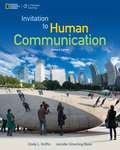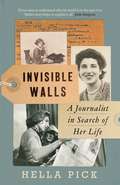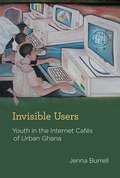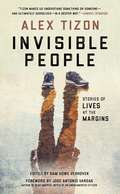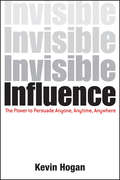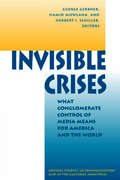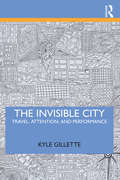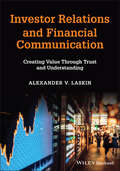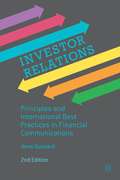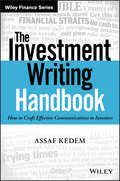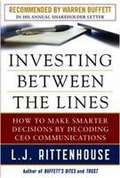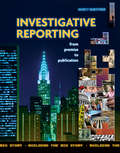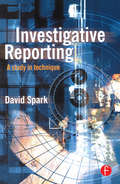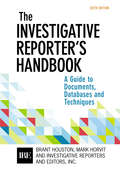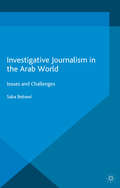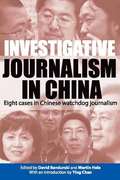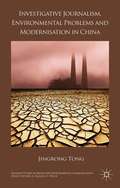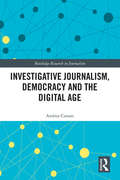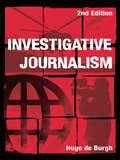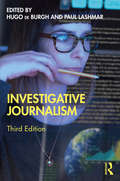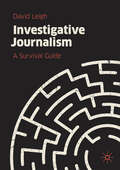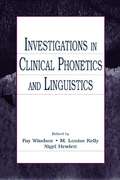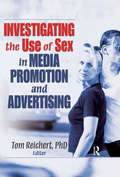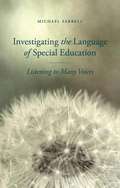- Table View
- List View
Invitation To Human Communication (Second Edition)
by Cindy Griffin Jennifer Emerling BoneWorking in partnership with National Geographic, INVITATION TO HUMAN COMMUNICATION, 2e acknowledges the complexity of today's workplace, the power of communication, and the importance of equipping readers with the foundational skills for success in this ever-changing environment. A leader in teaching foundational communication theories and skills, the text helps readers recognize the importance and centrality of communication in their professional and personal lives. Each chapter includes case studies and tips from nationally recognized explorers, scientists, researchers, and activists. The text showcases the best of communication theories and practices as well as explores how communication is central to carrying out work, developing professional and personal relationships with others, and sharing ideas with the larger public.
Invisible Walls: A Journalist in Search of Her Life
by Hella Pick'Memoirs of such richness are rare . . . a joy' JAMES NAUGHTIE'A remarkable personal journey, by one of the great political correspondents of our world - eloquent, enlightening, exhilarating' PHILIPPE SANDSA trailblazer for women in journalism, Hella Pick arrived in Britain in 1939 as a child refugee from Austria. Over nearly four decades she covered the volatile global scene, first in West Africa, followed by America and long periods in Europe. In her thirty-five years with the Guardian she reported on the end of Empire in West Africa, the assassination of President Kennedy, Martin Luther King's march from Selma to Montgomery, the Vietnam peace negotiation in Paris, the 1968 student revolt in France, the birth of the Solidarity movement in Poland, and the closing stages of the Cold War. A request for coffee on board a Soviet ship anchored in Malta led to a chat with Mikhail Gorbachev. A request for an interview with Willy Brandt led to a personal friendship that enabled her to come to terms with Germany's Nazi past.Her book is also a clarion call for preserving professionalism in journalism at a time when social media muddy the waters between fact and fiction, and between reporting and commentary.INVISIBLE WALLS tells the dramatic story of how a Kindertransport survivor won the trust and sometimes the friendship of world leaders, and with them a wide range of remarkable men and women. It speaks frankly of personal heartache and of a struggle over her Jewish identity. It is also the intensely touching story of how, despite a gift for friendship and international recognised achievements as a woman journalist, a continuing sense of personal insecurity has confronted her with a series of invisible walls.
Invisible Users
by Jenna BurrellThe urban youth frequenting the Internet cafes of Accra, Ghana, who are decidedly not members of their country's elite, use the Internet largely as a way to orchestrate encounters across distance and amass foreign ties--activities once limited to the wealthy, university-educated classes. The Internet, accessed on second-hand computers (castoffs from the United States and Europe), has become for these youths a means of enacting a more cosmopolitan self. In Invisible Users, Jenna Burrell offers a richly observed account of how these Internet enthusiasts have adopted, and adapted to their own priorities, a technological system that was not designed with them in mind. Burrell describes the material space of the urban Internet cafe and the virtual space of push and pull between young Ghanaians and the foreigners they encounter online; the region's famous 419 scam strategies and the rumors of "big gains" that fuel them; the influential role of churches and theories about how the supernatural operates through the network; and development rhetoric about digital technologies and the future viability of African Internet cafes in the region. Burrell, integrating concepts from science and technology studies and African studies with empirical findings from her own field work in Ghana, captures the interpretive flexibility of technology by users in the margins but also highlights how their invisibility puts limits on their full inclusion into a global network society.
Invisible People: Stories of Lives at the Margins
by Alex Tizon Sam Howe Verhovek“Somewhere in the tangle of the subject’s burden and the subject’s desire is your story.”—Alex Tizon Every human being has an epic story. The late Pulitzer Prize–winning writer Alex Tizon told the epic stories of marginalized people—from lonely immigrants struggling to forge a new American identity to a high school custodian who penned a New Yorker short story. Edited by Tizon’s friend and former colleague Sam Howe Verhovek, Invisible People collects the best of Tizon’s rich, empathetic accounts—including “My Family’s Slave,” the Atlantic magazine cover story about the woman who raised him and his siblings under conditions that amounted to indentured servitude. Mining his Filipino American background, Tizon tells the stories of immigrants from Cambodia and Laos. He gives a fascinating account of the Beltway sniper and insightful profiles of Surfers for Jesus and a man who tracks UFOs. His articles—many originally published in the Seattle Times and the Los Angeles Times—are brimming with enlightening details about people who existed outside the mainstream’s field of vision. In their introductions to Tizon’s pieces, New York Times executive editor Dean Baquet, Atlantic magazine editor in chief Jeffrey Goldberg, Pulitzer Prize winners Kim Murphy and Jacqui Banaszynski, and others salute Tizon’s respect for his subjects and the beauty and brilliance of his writing. Invisible People is a loving tribute to a journalist whose search for his own identity prompted him to chronicle the lives of others.
Invisible Influence: The Power to Persuade Anyone, Anytime, Anywhere
by Kevin Hogan"Invisible Influence is a masterpiece in understanding the science of influence and how to take it from convincing to compelling. Kevin Hogan shows you in plain English how to understand, apply, and master the science of persuasion. The book is brilliant- and you can be brilliantly persuasive. Buy the book, read the book, and implement the book."-Jeffrey Gitomer, author of The Sales Bible and The Little Book of Leadership"One eyebrow-raising, head-whacking, forehead-slapping technique after another. Anyone whose daily life depends on influencing people-in other words, everyone-should read this book. Buy copies for your friends and hide it from your enemies."-Richard Brodie, author of Virus of the Mind: The New Science of the Meme"Master persuaders know that it's not really about the words you use or the moves you make-other people get persuaded because of what you think and how you feel. Kevin Hogan explains in delightfully clear detail how to make these master-persuader secrets work for you. Not only that, he also explains why all of this works, and he shows you the exact scientific research that proves it!"-David Garfinkel, author of Advertising Headlines That Make You Rich"Invisible Influence is a masterpiece. It will be the master influencer's reference book for the years to come. Invisible influence is like oxygen, you can't see it, but your life depends on it. In this book, you will discover the persuasion tactics that will compel your clients to say yes to you-again and again."-Roberto Monaco, www.influenceology.com"Dump the script-it's old news before the ink's dry. Trust yourself and use your new understanding of the ever-changing context to succeed. In his fascinating book, Hogan weaves established research findings into a handbook for successful influence. The guidelines are obvious but hidden, simple but profound. Understand them and you've mastered the complex and crucial art of persuasion."-William D. Crano, author of The Rules of Influence: Winning When You're in the Minority"Many write on the topic of persuasion. Precious few genuinely understand it. Kevin is one of those precious few. Read everything you can by him."-Mark Joyner, founder and CEO of Simpleology, www.simpleology.com
The Invisible Game: The Secrets and the Science of Winning Minds and Winning Deals
by Kai-Markus Mueller Gabriele RehbockCutting-edge science can make all the difference for salespeople in a time when they are facing a business world in transformation. In The Invisible Game: The Secrets and the Science of Winning Minds and Winning Deals, neuroscientist Kai-Markus Mueller and sales professional Gabriele Rehbock deliver a hands-on guide to the hidden dynamics that influence the outcomes of most business deals. In plain English, the book unpacks recently discovered insights from psychology, behavioural economics, and neuroscience and explains how to apply them to your advantage in real-life business situations. The authors show you how to influence buying decisions and how to successfully respond to challenging business situations in order to put you in control of the levers that drive sales success. You&’ll also find Advanced strategies and tactics that offer a lasting edge in negotiations, sales and other business transactions Smart techniques to build rewarding customer relationships The psychology behind gains and losses revealing new keys to profitable pricing Real-life advice on how to counter a buyer&’s intimidation tactics: time, uncertainty, fear, and silence An essential, step-by-step playbook for sales professionals, The Invisible Game will also earn a place on the bookshelves of entrepreneurs, business owners, and other independent professionals—like lawyers, accountants, freelancers, consultants, and programmers—who regularly sell their services to other businesses.
Invisible Crises: What Conglomerate Control of Media Means for America and the World (Critical Studies in Communication and in the Cultural Industries)
by George GerbnerHidden from public sight and mind today are invisible crises that threaten our democracy and existence more than the crises we know about—or think we know about. These invisible crises include the promotion of practices that drug, hurt, poison, and kill thousands every day; cults of violence that desensitize, terrorize, and brutalize; the growing siege mentality of our cities; widening resource gaps and the most glaring inequalities in the industrial world; the costly neglect of vital institutions such as public education and the arts; and media-assisted make-believe image politics corrupting the electoral process.Deprived of sustained attention but bombarded by eruptions of surface consequences (often presented as unique events stripped of historical context), people ar bewildered, fearful, angry, and cynical.The contributors to this volume—exploring such unattended crises, analyzing why they are hidden, and focusing on the increasing concentration of culture-power that keeps them from view—maintain that a profound general crisis of social vision, public communication, and representative government underlies all of the invisible crises.
The Invisible City: Travel, Attention, and Performance
by Kyle GilletteThe Invisible City explores urban spaces from the perspective of a traveller, writer, and creator of theatre to illuminate how cities offer travellers and residents theatrical visions while also remaining mostly invisible, beyond the limits of attention. The book explores the city as both stage and content in three parts. Firstly, it follows in pattern Italo Calvino's novel Invisible Cities, wherein Marco Polo describes cities to the Mongol emperor Kublai Khan, to produce a constellation of vignettes recalling individual cities through travel writing and engagement with artworks. Secondly, Gillette traces the Teatro Potlach group and its ongoing immersive, site-specific performance project Invisible Cities, which has staged performances in dozens of cities across Europe and the Americas. The final part of the book offers useful exercises for artists and travellers interested in researching their own invisible cities. Written for practitioners, travellers, students, and thinkers interested in the city as site and source of performance, The Invisible City mixes travelogue with criticism and cleverly combines philosophical meditations with theatrical pedagogy.
Investor Relations and Financial Communication: Creating Value Through Trust and Understanding (Handbooks In Communication And Media Ser.)
by Alexander V. LaskinEquips students and professionals with the fundamental skills and knowledge needed to succeed in investor relations and financial communication Investor Relations and Financial Communication is a comprehensive, up-to-date introduction to the investor relations and financial communication profession. Written by a leading educator and professional consultant, this authoritative textbook provides the well-rounded foundation necessary for anyone wanting to begin a career as an Investor Relations Officer (IRO). Detailed yet accessible chapters describe all essential aspects of the field, including communication skills, basic financial knowledge, legal and regulatory guidelines, professional standards and practices, and more. Organized in five sections, the book first identifies and defines the jobs available in investor relations and financial communication, detailing the responsibilities, titles, salaries, and key players in the industry. After thoroughly explaining the disclosure of financial and non-financial information, the author describes the regulatory environment in which professionals operate and offers expert insight into issues of corporate governance, environmental sustainability, social responsibility, shareholder activism, and crisis management. Subsequent sections highlight the day-to-day activities of investor relations and financial communication professionals and discuss the future of the field. This invaluable textbook also: Describes the responsibilities of the Investor Relations Officer throughout initial public offering, periodic reporting, and performance evaluation Discusses the role of investor relations professionals in disclosing financial information and educating the investment community Emphasizes the various skills that IROs must possess in order to do their jobs successfully, such as marketing and securities law compliance Includes end-of-chapter review questions, activities, and lists of key terms Investor Relations and Financial Communication: Creating Value Through Trust and Understanding is the perfect textbook for both professional development training programs and undergraduate and graduate courses in investor relations, and is required reading for all those working in investor relations, particularly early-career professionals.
Investor Relations
by Anne GuimardThis practical guide on the theory and practice of Investor Relations combines the art and science of marketing, financial analysis, and financial communications in a single source. It offers expert advice and helpful tips to be used in real business life by corporate executives, financial analysts, students, and anyone competing for capital.
The Investment Writing Handbook: How to Craft Effective Communications to Investors (Wiley Finance)
by Assaf KedemThe writing "bible" for financial professionals The Investment Writing Handbook provides practical, accessible guidance for crafting more effective investor communications. Written by an award-winning writer, editor, and speechwriter, this book explains the principles and conventions that help writing achieve its purpose; whether you need to inform, educate, persuade, or motivate, you'll become better-equipped to develop a broad range of communications and literature for investor consumption. Examples from real-world financial institutions illustrate expert execution, while explanations and advice targeted specifically toward investor relations give you the help you need quickly. From white papers and investment commentary to RFPs, product literature, and beyond, this book is the financial writer's "bible" that you should keep within arm's reach. Investment writing is one of the primary influences on investors' attitudes. It educates, informs decisions, shapes opinions, and drives behavior—so shouldn't it be expertly-crafted to achieve its intended goal? This book explains the "tricks of the trade" to help you get your message across. Understand the principles of effective investor communication Master the conventions of informative and persuasive writing Examine well-written sample documents from real-world institutions Improve research papers, presentations, investor letters, marketing literature, and more Virtually all firms with investors as clients need to communicate to them regularly, but few financial professionals receive formal training in investor communications. When investors' opinions, attitudes, and actions determine the health of your company, it is vitally important that these communications not be left to chance. The Investment Writing Handbook provides essential guidance and clear explanations to help you transform your communication strategy, execution, and results.
Investing Between the Lines: How to Make Smarter Decisions by Decoding CEO Communications
by L. J. RittenhouseIn Investing Between the Lines, CEO communications expert, L. J. Rittenhouse offers a proven methodology for accurately analyzing the worthiness of an investment: Reading corporate "fog," i.e., shareholder letters, and other corporate correspondence. Based on a model that's made believers of Warren Buffet and Jack Welch, Rittenhouse looks at the "fog" of 100 Fortune 500 companies—and then overlays these "Fog rankings" on the stock's price performance. It's a system that made Rittenhouse one of the very first to predict the Lehman Bros. implosion, and other financia disasters—and that will arm investors with the skills and knowledge to unearth hidden risks in their portfolios and pick potential winners. L. J. Rittenhouse is president of Rittenhouse Rankings Inc, a CEO strategic and investor relations company that annually conducts a benchmark survey of CEO candor and stock price performance
Investigative Reporting from Premise to Publication
by Marcy BurstinerThis book gives readers the confidence they need to handle any investigative reporting assignment and to produce demonstrated results. Its step-by-step progression covering the entire investigative process will help them stay on track to complete stories of any size. The book answers relevant questions such as "Where can I find a story?" "What do I do when a source won't talk?" "How can I find the right documents to support my story?" "How can I present this story online?" and "How can a spreadsheet keep it all from falling apart?" Investigative Reporting contains full stories and timely examples from both professional and student reporters. Each chapter concludes with sequential "Big Story" assignments to help readers research, write and publish their own investigative stories. Web links to online resources (including public records information, computer-assisted reporting techniques and interactive investigative story examples) will help readers move smoothly and successfully through an investigative story or team reporting project, whether for print, broadcast or the Web.
Investigative Reporting: A study in technique
by David SparkThis important book defines what investigative reporting is and what qualities it requires. Drawing on the experience of many well-known journalists in the field, the author identifies the skills, common factors and special circumstances involved in a wide variety of investigations. It examines how opportunities for investigations can be found and pursued, how informants can be persuaded to yield needed information and how and where this information can be checked. It also stresses the dangers and legal constraints that have to be contended with and shows real life examples such as the Cook Report formula, the Jonathan Aitken investigation and the Birmingham Six story. David Spark, himself a freelance writer of wide experience, examines how opportunities for investigations can be found and pursued, how informants can be persuaded to yield needed information and how and where this information can be checked. He also stresses the dangers and legal constraints that have to be contended with and shows investigators at work in two classic inquiries: · The mysterious weekend spent in Paris by Jonathan Aitken, then Minister of Defence Procurement· The career of masterspy Kim PhilbyInvestigative Reporting looks at such fields for inquiry as company frauds (including those of Robert Maxwell), consumer complaints, crime, police malpractice, the intelligence services, local government and corruption in Parliament and in overseas and international bodies.The author believes that the conclusions that emerge from this far-reaching survey are of value not only in investigative journalism, but to practitioners in all branches of reporting.
The Investigative Reporter’s Handbook: A Guide To Documents, Databases, And Techniques
by Brant Houston Mark Horvit Investigative Reporters Inc. EditorsBuild the fundamental investigative writing and reporting skills you need to investigate anything and anyone. The text’s easy-to-use handbook style allows readers to quickly access any information--everything from how to build quality reporting skills and collaborate on investigations to tips for researching a variety of beats. This is the text on investigative reporting, infused with illustrative quotes and instructive examples from highly-respected journalists around the world.
Investigative Journalism in the Arab World: Issues and Challenges (Palgrave Studies in Communication for Social Change)
by Saba BebawiThis is the first book that looks into the state and role of investigate journalism in the Arab world. It explores the vital role the media could potentially play in informing and empowering society, to assist in opening up the communicative space in a region where this has previously been taboo.
Investigative Journalism in China
by David BandurskiDespite persistent pressure from state censors and other tools of political control, investigative journalism has flourished in China over the last decade. This volume offers a comprehensive, first-hand look at investigative journalism in China, including insider accounts from reporters behind some of China's top stories in recent years. While many outsiders hold on to the stereotype of Chinese journalists as docile, subservient Party hacks, a number of brave Chinese reporters have exposed corruption and official misconduct with striking ingenuity and often at considerable personal sacrifice. Subjects have included officials pilfering state funds, directors of public charities pocketing private donations, businesses fleecing unsuspecting consumers - even the misdeeds of journalists themselves. These case studies address critical issues of commercialization of the media, the development of ethical journalism practices, the rising specter of "news blackmail," negotiating China's mystifying bureaucracy, the dangers of libel suits, and how political pressures impact different stories. During fellowships at the Journalism & Media Studies Centre of the University of Hong Kong, these narratives and other background materials were fact-checked and edited by JMSC staff to address critical issues related to the media transitions currently under way in the PRC. This engaging narrative gives readers a vivid sense of how journalism is practiced in China. --David Bandurski is a scholar at the University of Hong Kong's China Media Project, a research and fellowship initiative of the Journalism & Media Studies Centre. Martin Hala has taught journalism at the Universities in Prague and Bratislava. -
Investigative Journalism, Environmental Problems and Modernisation in China
by Jingrong TongThis book examines how the news media in general, and investigative journalism in particular, interprets environmental problems and how those interpretations contribute to the shaping of a discourse of risk that can compete against the omnipresent and hegemonic discourse of modernisation in Chinese society.
Investigative Journalism, Democracy and the Digital Age (Routledge Research in Journalism)
by Andrea CarsonTheoretically grounded and using quantitative data spanning more than 50 years together with qualitative research, this book examines investigative journalism’s role in liberal democracies in the past and in the digital age. In its ideal form, investigative reporting provides a check on power in society and therefore can strengthen democratic accountability. The capacity is important to address now because the political and economic environment for journalism has changed substantially in recent decades. In particular, the commercialization of the Internet has disrupted the business model of traditional media outlets and the ways news content is gathered and disseminated. Despite these disruptions, this book’s central aim is to demonstrate using empirical research that investigative journalism is not in fact in decline in developed economies, as is often feared.
Investigative Journalism
by Hugo De BurghPraise for the first edition: ‘A surprising book. I’m surprised that it hasn’t been done before, and I’d also be surprised if anyone did it better.’– Roger Cook, The Cook Report, Central Television ‘A book that no aspiring student of the subject can do without.’ – Jon Snow, Channel 4 News Investigative journalism has helped bring down governments, imprison politicians, trigger legislation, reveal miscarriages of justice and shame corporations. Even today, when much of the media colludes with power and when viciousness and sensationalism are staples of formerly high-minded media, investigative journalists can stand up for the powerless, the exploited, the truth. Investigative Journalism provides an unrivalled introduction to this vital part of our social life: its origins, the men and women who established its norms and its achievements in the last decades. Two chapters describe the relationships with the law, bringing us up to date, and others deal with the professional techniques, the sociology and the teaching of investigative journalism. A further new chapter examines the influence of the blogosphere on investigative journalism. The case studies of the first edition have been supplemented by new chapters: the investigators and methods which revealed the subcontracting of the torture of Iraqi prisoners; how the murder of Stephen Lawrence was treated in the Daily Mail; the tabloids and their investigations; BBC Panorama.
Investigative Journalism
by Hugo de Burgh; Paul LashmarThis third edition maps the new world of investigative journalism, where technology and globalisation have connected and energised journalists, whistle-blowers and the latest players, with far-reaching consequences for politics and business worldwide. In this new edition, expert contributors demonstrate how crowdsourcing, big data, globalisation of information, and changes in media ownership and funding have escalated the impact of investigative journalists. The book includes case studies of investigative journalism from around the world, including the exposure of EU corruption, the destruction of the Malaysian environment, and investigations in China, Poland and Turkey. From Ibero-America to Nigeria, India to the Arab world, investigative journalists intensify their countries’ evolution by inquisition and revelation. This new edition reveals how investigative journalism has gone digital and global. Investigative Journalism is essential for all those intending to master global politics, international relations, media and justice in the 21st century.
Investigative Journalism: A Survival Guide
by David LeighAt a time of hyper-partisanship, media fragmentation and "fake news", the work of investigative journalism has never been more important. This book explores the history and art of investigative journalism, and explains how to deal with legal bullies, crooked politicians, media bosses, big business and intelligence agencies; how to withstand conspiracy theories; and how to work collaboratively across borders in the new age of data journalism. It also provides a fascinating first-hand account of the work that went into breaking major news stories including WikiLeaks and the Edward Snowden affair.Drawing on over 40 years of experience with world-leading investigative teams at newspapers including the Guardian and The Washington Post, award-winning journalist David Leigh provides an illuminating insight into some of the biggest news events of the 20th and 21st centuries. This book is essential reading for anyone interested in the behind-the-scenes work of journalists and news organizations. It also acts as an essential practical toolkit for both aspiring and established investigative journalists.
Investigations in Clinical Phonetics and Linguistics
by Fay Windsor M. Louise Kelly Nigel HewlettInvestigations in Clinical Phonetics and Linguistics is a sequel to the eighth meeting of the International Clinical Phonetics and Linguistics Association, attended by delegates from 26 different countries. This book reflects the scope of the subject area of clinical phonetics and linguistics, the balance of input into it with respect to the different kinds of research being carried on, and the representation of researchers from different parts of the world. Its scope includes the application of all levels of linguistic analysis and the chapters of the book have been ordered as far as possible according to linguistic level, beginning with pragmatics and ending with acoustics. It will be immediately apparent that a greater number of chapters are concerned with applications of phonetics and phonology then with any other levels.
Investigating the Use of Sex in Media Promotion and Advertising
by Tom ReichertThe latest scholarship on one of today&’s most pressing issues Today, it is obvious that sexual content is a prevalent aspect of the media and that the intensity of this content has increased in recent years. Less obvious, however, are the direct effects the strategic use of sexual content has on audiences. Investigating the Use of Sex in Media Promotion and Advertising presents the latest scholarship on the role of sex in the most common media outlets-television programming, radio "shock jocks," music videos, magazines, and advertising. The eye-opening contributions from over a dozen recognized experts in the field provide useful empirical evidence on media-conveyed sexual stimuli and look toward moving the public dialogue on sex in the media further along. Often, opinions regarding sex in the media have little or no scientific grounding and even when scientific-grounded arguments are offered, they suffer from wide gaps in research-based knowledge. Investigating the Use of Sex in Media Promotion and Advertising is the important compilation that fills these knowledge gaps. In delving into this pressing issue, it not only offers timely findings that provide an indication of the nature, prevalence, and effects of sexual information when used as a promotional tool, but suggests new directions for the study of sex and media as well. This informative text is also extensively referenced and features numerous tables to clearly present research data. Chapters in Investigating the Use of Sex in Media Promotion and Advertising examine: the nature and extent of sexually appealing newscasters primarily on cable news programs commentary and camera angles of women&’s sporting events in the 2004 Summer Olympic Games the efficacy of both sexual content and sexual self-schema on consumers&’ attitudes toward promotional announcements, advertised programs, viewing intention, and self-reported arousal the history and content analysis of "shock jock" radio like the Howard Stern and the Bob & Tom shows the relationship among sexual content in music videos, viewer enjoyment, and actual product purchase intention Maxim magazine&’s cover formula and the competitive response from other men&’s lifestyle magazines the efficacy of men&’s magazines&’ sexual cover models on consumer outcome variables, including interest and purchase intention an international perspective of nudity in advertising in magazines versus on television a case study of the sexual appeals used in several billboard ads for the Hard Rock Hotel and Casino in Las Vegas and much more! Filled with insightful and groundbreaking information, Investigating the Use of Sex in Media Promotion and Advertising is a vital resource for advertising and media professionals as well as educators and upper-level and graduate students in media, communications, and advertising programs.
Investigating the Language of Special Education
by Michael FarrellUtilising a wide range of theoretical traditions from philosophy, sociology and anthropology, this book aims to raise the reader's awareness of the power as well as the limitations of language in relation to special education.
